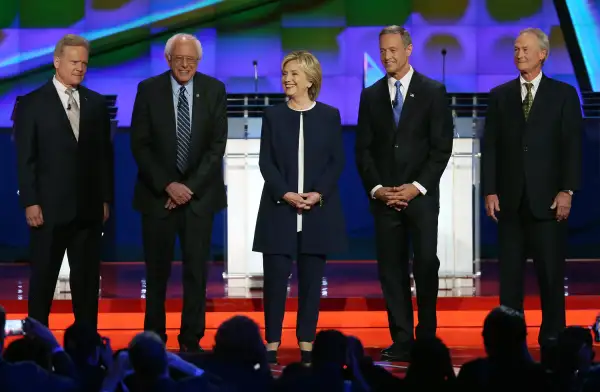The Big Money Falsehoods You Heard At Last Night's Debate

Your wallet got a lot of play in last night's Democratic debate, as the presidential hopefuls broached topics ranging from student debt to Wall Street greed.
But not everything the candidates said on stage was true. Based on a fact-check by the Associated Press, here are their big money claims that you shouldn't take at face value.
Almost all income growth is going to the top 1%.
Bernie Sanders made this claim twice last night—in his opening statement, and in a back-and-forth with Hillary Clinton over Sanders's defense of "democratic socialism."
"I think everybody is in agreement that we are a great entrepreneurial nation...Of course, we have to support small and medium-sized businesses," Sanders said. "But you can have all of the growth that you want and it doesn't mean anything if all of the new income and wealth is going to the top 1 percent."
According to the AP, Sanders relied on an outdated source. From 2009 to 2012, the first three years of rebuilding after the economic meltdown, 91% of new U.S. income did go to the richest 1% of Americans. But extend that window to 2014, and America's wealthiest 1% received just 58% of new income—a stat that Bernie got close to (saying 57% instead of 58%) at a different point in the debate.
That's a huge percentage, but it's not "all" or "almost all."
Public colleges and universities will be "tuition free."
Clinton and Sanders both made the claim that they would enable tuition-free public college education for all Americans who need it, though their plans to do so are notably different. Hillary Clinton has said she has no interest in "making college free for Donald Trump's kids," for example, and thinks that students should work about 10 hours a week.
But as the AP notes, there's no such thing as a free lunch. While free for students, both plans will shift the cost of college tuition onto taxpayers—Sanders's $70 billion-a-year proposal mostly by taxing trading in the financial markets and Clinton's, expected to cost about half as much, by "closing tax loopholes…for the most fortunate," according to campaign documents.
Sanders' plan will still leave students to pay for room and board ($9,800 on average); Clinton's offers no relief to the 40 million already graduated Americans with a collective $1.2 trillion in student debt.
Raising the minimum wage to $15 an hour will help rebuild the middle class.
This one isn't exactly false—but it may not be entirely true either. As the AP points out, raising the minimum wage will up the pay of many low-income Americans, but it could also cause widespread job losses.
Currently, about 42% of Americans make less than $15 an hour—disproportionately female, African American, and Latino workers in the service industry—and eight mostly rural Midwestern states have median hourly wages below $15.
Raising the federal wage floor to $15 an hour would mean nearly doubling the current federal minimum, and may prompt low-wage employers to outsource or automate some jobs. Those most likely to be affected are those who are disadvantaged by current low hourly wages.
On the other hand, recent research suggests that "modest" increases in minimum wage have little effect on jobs.
Clinton was "hopeful" about the Trans-Pacific Partnership but reserved judgment until last week.
Anderson Cooper's first question of the night was directed at Hillary Clinton: "Will you say anything to get elected?" he asked, calling her out for flip-flopping on, among other things, the Trans-Pacific Partnership.
Martin O'Malley and Bernie Sanders have both vehemently opposed this trade agreement based on the threat it poses to American middle-class workers. After calling it the "gold standard in trade agreements" back in 2012, Clinton came out against the TPP last week.
Clinton responded to Cooper's question by saying that she said had "hoped that it would be the gold standard" back in 2012, but that now in 2015, "it didn't meet my standards."
This one, based on the State Department's transcript, is simply a lie.